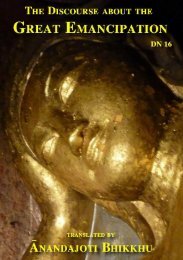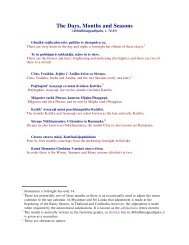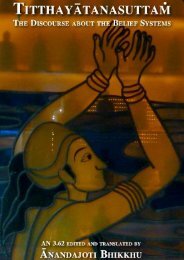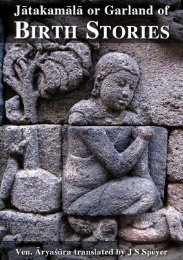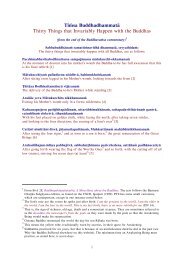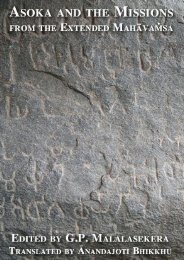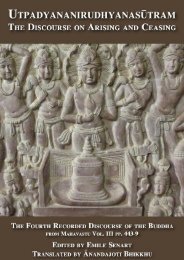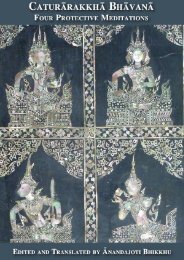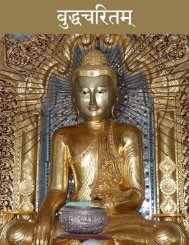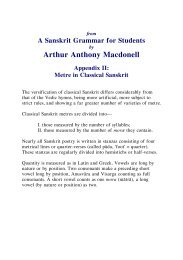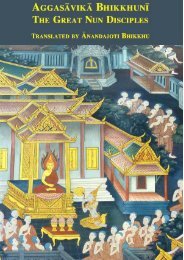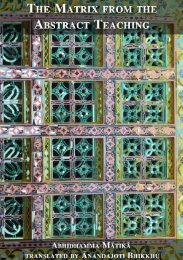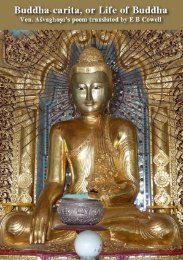MahÄkhandhako The Great Chapter - Ancient Buddhist Texts
MahÄkhandhako The Great Chapter - Ancient Buddhist Texts
MahÄkhandhako The Great Chapter - Ancient Buddhist Texts
You also want an ePaper? Increase the reach of your titles
YUMPU automatically turns print PDFs into web optimized ePapers that Google loves.
<strong>The</strong> <strong>Great</strong> <strong>Chapter</strong> - 66<br />
Atha kho Bhagavā tad-avasese bhikkhū Dhammiyā kathāya ovadi anusāsi.<br />
<strong>The</strong>n the Gracious One gave advice and instruction with a Dhamma talk to the<br />
remaining monks.<br />
Atha kho āyasmato ca Vappassa āyasmato ca Bhaddiyassa<br />
<strong>The</strong>n to the venerable Vappa and to the venerable Bhaddiya<br />
Bhagavatā dhammiyā kathāya ovadiyamānānaṁ anusāsiyamānānaṁ<br />
as the Gracious One gave advice and instruction 129 with a Dhamma talk<br />
virajaṁ, vītamalaṁ, Dhammacakkhuṁ udapādi:<br />
the dust-free, stainless, Vision-of-the-Dhamma arose:<br />
“Yaṁ kiñci samudayadhammaṁ,<br />
“Whatever has the nature of arising,<br />
sabban-taṁ nirodhadhamman”-ti.<br />
all that has the nature of ceasing.”<br />
Te diṭṭhadhammā pattadhammā,<br />
<strong>The</strong>y, having seen the Dhamma, attained the Dhamma, 130<br />
viditadhammā pariyogāḷhadhammā tiṇṇavicikicchā vigatakathaṁkathā,<br />
understood the Dhamma, penetrated the Dhamma, crossed over uncertainty, being<br />
without doubts,<br />
vesārajjappattā aparappaccayā Satthusāsane Bhagavantaṁ etad-avocuṁ:<br />
having attained full confidence, having become independent of others in the<br />
Teacher’s teaching, said this to the Gracious One:<br />
“Labheyyāma mayaṁ Bhante Bhagavato santike pabbajjaṁ,<br />
“May we receive the going-forth, venerable Sir, in the presence of the Gracious One,<br />
labheyyāma upasampadan.”-ti<br />
may we receive the full ordination.”<br />
“Etha bhikkhavo” ti Bhagavā avoca “svākkhāto Dhammo,<br />
“Come, monks,” said the Gracious One, “the Dhamma has been well-proclaimed,<br />
129 ovadiyamānānaṁ anusāsiyamānānaṁ are genitive absolute constructions giving durative<br />
sense.<br />
130 According to the commentary and Jā Nid Vappa attained on the first day after Vesākha,<br />
and Bhaddiya on the second, but it is hard to reconcile this with the text which treats them<br />
both together. <strong>The</strong>re is a similar problem with Mahānāma and Assaji below, who are said by<br />
the commentary to have attained on the third and fourth days of the waning moon. That<br />
they were ordained in pairs strongly suggests that they attained at the same time.



